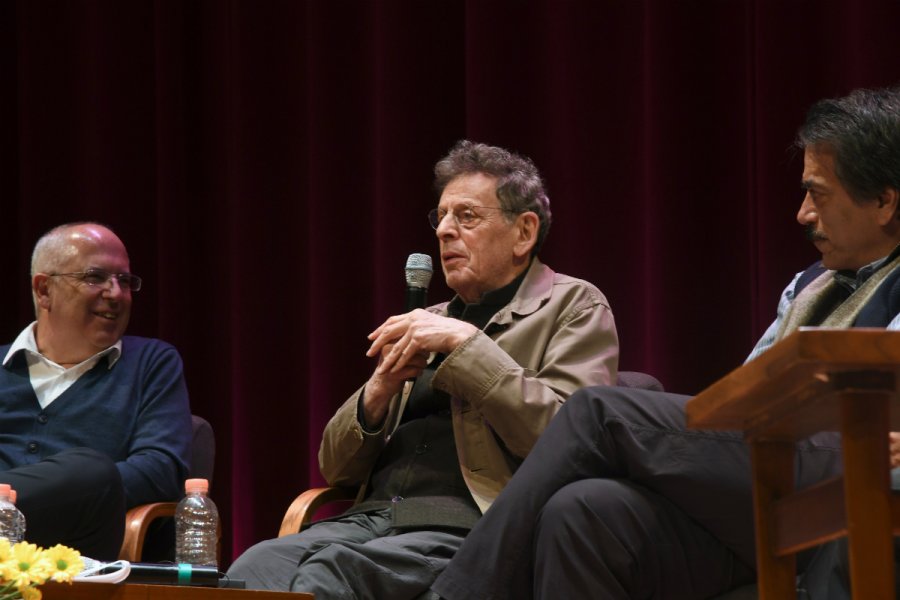Noticias
Philip Glass presented his autobiographical book Palabras sin música
December 01, 2017“They are a wonderful medicine that can cure us, heal us and we must make efforts to allow them to continue,"said one of the most representative and influential composers of the twentieth century, who presented his autobiographical book Palabras sin música (Words without music), on Thursday night November 30th in the Jaime Torres Bodet auditorium of the National Museum of Anthropology.
“I have traveled to India, Africa and Australia. I have spent time with the people I met and I was always with music. What I wanted to do was to take the ethos, the heart of the culture and absorb everything I could to make it my own. I only have one life to do things and I was going to do everything I could”.
Although he admited that in his own country and in many others there is little appreciation for cultural roots, Glass said he felt fortunate to be connected in recent decades with Mexico, its history and culture, which is reflected in proposals such as The Spirit of the Earth, where he collaborates with Wixárikas musicians.
“One of the great things about working with people who are still alive and they are part of the ancient tradition as the Wixárika people is that we can listen to the words, whether they are translated, that are beautiful”.
It is precisely with this musical project that the artist will celebrate 80 years of life with two performances in the Narciso Divino Auditorium of the Universidad del Claustro de Sor Juana, on December 2 and 5.
The festivities will continue in 2018, on May 11 and 13, when the National Symphony Orchestra will perform for the first time in our country its creation titled Sinfonía Tolteca.
“What is now important is the rediscovery of the deep culture of indigenous peoples not only in Mexico, but also in other regions such as Africa, Australia and parts of South America”.
To publicize the title published by Ediciones Malpaso, Philip Glass was accompanied by the director of the National Museum of Anthropology, Antonio Saborit, the anthropologist Víctor Sánchez, the political scientist Jesús Silva-Herzog Márquez and the editor-in-chief of the Culture section of the newspaper La Jornada Pablo Espinosa.
“The book opens up the opportunity to listen to the two stories: that of the composer who has left a mark on 20th century music, but also that of the human being who went to the most remote corners of the world to find food for his spirit”, said anthropologist Victor Sanchez.
He considered that Glass developed his musical universe and set himself the task of finding an audience at a time when it was innovative and difficult to accept music, which was described as minimalist, a term that is currently displeased by the American composer.
According to political scientist Jesús Silva-Herzog Márquez, the publication does not represent a memory of a musician who would like to display his genius or remind us of his innovation and his great contribution to contemporary music.
“In this cultural immersion and spiritual search comes a warning that music may be the best tool to challenge this tyranny of separations, this dictatorship that makes us live in separate vessels”.
He pointed out that it is a book of a wise man who recounts his life not with the disciplinary sense of a lesson, but with the meaning of a parable.
For historian Antonio Saborit, Palabras sin música is an essential logbook, is a journey through several decades of Philip Glass's life and how he has come across his songs, sound and rhythm.
“In that journey he highlights what has changed from when he was a sorcerer's apprentice to these days. He makes two or three notes that seem to me to be relevant: the first has to do with the teachings of Nadia Boulanger; the breadth of the canon to which the music students were exposed; the ethnomusicology that did not exist and is now an essential part of the formation of musicians and the changes in the way of composing ".
Meanwhile, journalist Pablo Espinosa expressed that the book teaches us how to think about music and gives us a language beyond words in a pleasant conversation.
Mexico,Distrito Federal
